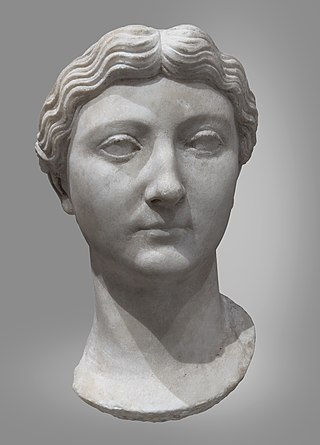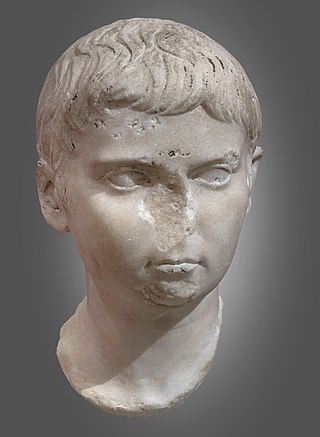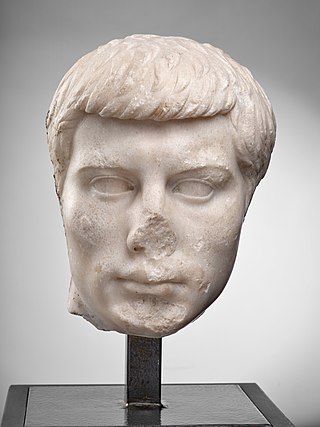Related Research Articles

Julia Agrippina, also referred to as Agrippina the Younger, was Roman empress from AD 49 to 54, the fourth wife and niece of emperor Claudius, and the mother of Nero.

Tiberius Julius Caesar Augustus was Roman emperor from AD 14 until 37. He succeeded his stepfather Augustus, the first Roman emperor. Tiberius was born in Rome in 42 BC to Roman politician Tiberius Claudius Nero and his wife, Livia Drusilla. In 38 BC, Tiberius's mother divorced his father and married Augustus. Following the untimely deaths of Augustus's two grandsons and adopted heirs, Gaius and Lucius Caesar, Tiberius was designated Augustus's successor. Prior to this, Tiberius had proved himself an able diplomat, and one of the most successful Roman generals: his conquests of Pannonia, Dalmatia, Raetia, and (temporarily) parts of Germania laid the foundations for the empire's northern frontier.

Livia Drusilla was Roman empress from 27 BC to AD 14 as the wife of Augustus, the first Roman emperor. She was known as Julia Augusta after her formal adoption into the Julia gens in AD 14.

Marcus Agrippa Postumus, later named Agrippa Julius Caesar, was a grandson of Roman Emperor Augustus. He was the youngest child of Marcus Vipsanius Agrippa and Julia the Elder. Augustus initially considered Postumus as a potential successor and formally adopted him as his heir, before banishing Postumus from Rome in AD 6 on account of his ferocia. In effect, though not in law, the action cancelled his adoption and virtually assured Tiberius' emplacement as Augustus' sole heir. Postumus was ultimately executed by his own guards shortly after Augustus' death in AD 14.

Lucius Aelius Sejanus, commonly known as Sejanus, was a Roman soldier, friend, and confidant of the Roman Emperor Tiberius. Of the Equites class by birth, Sejanus rose to power as prefect of the Praetorian Guard, the imperial bodyguard, of which he was commander from AD 14 until his execution for treason in AD 31.

Tiberius Julius Caesar Nero, known as Tiberius Gemellus, was the son of Drusus and Livilla, the grandson of the Emperor Tiberius, and the cousin of the Emperor Caligula. Gemellus is a nickname meaning "the twin". His twin brother, Germanicus Gemellus, died as a young child in AD 23. His father and older cousins died, and are suspected by contemporary sources as having been systematically eliminated by the powerful praetorian prefect Sejanus. Their removal allowed Gemellus and Caligula to be named joint-heirs by Tiberius in 35, a decision that ultimately resulted in Caligula assuming power and having Gemellus killed in late 37 or early 38.

Drusus Julius Caesar, also called Drusus the Younger, was the son of Emperor Tiberius, and heir to the Roman Empire following the death of his adoptive brother Germanicus in AD 19.

Drusus Caesar was the grandson by adoption and heir of the Roman emperor Tiberius, alongside his brother Nero. Born into the prominent Julio-Claudian dynasty, Drusus was the son of Tiberius' general and heir, Germanicus.

Julia Livia, was the daughter of Drusus Julius Caesar and Livilla, and granddaughter of the Roman Emperor Tiberius. She was also a first cousin of the emperor Caligula, and niece of the emperor Claudius.
Gaius Asinius Gallus was a Roman senator, son of Gaius Asinius Pollio and Quinctia. He was the second husband of Vipsania, whose first husband Tiberius ultimately imprisoned him.

Vipsania Agrippina was the first wife of the Emperor Tiberius. She was the daughter of Marcus Vipsanius Agrippa and Attica, thus being a granddaughter of Titus Pomponius Atticus, the best friend of Cicero.

Nero Julius Caesar was the adopted grandson and heir of the Roman emperor Tiberius, alongside his brother Drusus. Born into the prominent Julio-Claudian dynasty, Nero was the son of Tiberius' general and heir, Germanicus. After the deaths of his father and of Tiberius' son, Drusus the Younger, Nero and his brother Drusus were adopted together by Tiberius in September AD 23. As a result of being heirs of the emperor, he and his brother enjoyed accelerated political careers.

Marcus Claudius Marcellus was the eldest son of Gaius Claudius Marcellus and Octavia Minor, sister of Augustus. He was Augustus' nephew and closest male relative, and began to enjoy an accelerated political career as a result. He was educated with his cousin Tiberius and traveled with him to Hispania where they served under Augustus in the Cantabrian Wars. In 25 BC he returned to Rome where he married his cousin Julia, who was the emperor's daughter. Marcellus and Augustus' general Marcus Vipsanius Agrippa were the two popular choices as heir to the empire. According to Suetonius, this put Agrippa at odds with Marcellus, and is the reason why Agrippa traveled away from Rome to Mytilene in 23 BC.
Appius Junius Silanus, whom Cassius Dio calls Gaius Appius Silanus, was consul in AD 28, with Publius Silius Nerva as his colleague. He was accused of majestas, or treason, in AD 32 along with a number of senators, but he and Gaius Calvisius Sabinus were saved by one of the informers, Celsus, a tribune of a city cohort.
Clutorius Priscus was a Roman poet.
Marcus Plautius Silvanus was a Roman politician and general active during the Principate. He was consul in 2 BC as the colleague of the emperor Augustus.
Quintus Junius Blaesus was a Roman politician who lived during the reigns of Augustus and Tiberius. He was the maternal uncle of Lucius Aelius Sejanus, the Praetorian Prefect of Emperor Tiberius.
LuciusFulcinius Trio was a Roman senator who came from a plebeian family. Trio was an active prosecutor (delator) during the reign of Tiberius who developed a reputation for making accusations. He was governor of Lusitania from about 21 to 31, before returning to Rome to hold the office of consul suffect with Publius Memmius Regulus in 31. His friendship with Sejanus would lead to allegations that ended with his suicide in early 35.
Sextus Papinius Allenius was a Roman senator of the First Century AD. He was a consul ordinarius in AD 36 with Quintus Plautius as his colleague. Allenius is known for introducing two fruits to Italy: jujube (zizipha) which he brought from Syria; and a variety of crabapple (tuber) which he found in Africa. According to Pliny the Elder, Allenius had grown them in his camp from slips; and he adds about the crabapple that "the fruit is more like a berry than an apple, but the trees make a particularly good decoration for terraces."

The gens Sanquinia was a minor plebeian family at ancient Rome, which rose out of obscurity in imperial times to attain the highest offices of the Roman state. Members of this gens are first mentioned in the time of Augustus, and Quintus Sanquinius Maximus held the consulship under Tiberius and Caligula. The family vanishes from history in the time of Claudius.
References
- 1 2 Cassius Dio, lviii. 21
- ↑ Syme, Ronald (1949). "Personal Names in Annals I-VI". The Journal of Roman Studies. 39. Society for the Promotion of Roman Studies: 6-18 (13). doi:10.2307/297702. JSTOR 297702.
- ↑ Martin, Ronald (2001). Tacitus: Annals V and VI. Oxford University Press. p. 178. ISBN 9781800346239.
- ↑
 Smith, William (1870). "Agrippa, Vibulenus". In Smith, William (ed.). Dictionary of Greek and Roman Biography and Mythology . Vol. 1. p. 78.
Smith, William (1870). "Agrippa, Vibulenus". In Smith, William (ed.). Dictionary of Greek and Roman Biography and Mythology . Vol. 1. p. 78. - ↑ Tacitus, Annales vi. 40
- ↑ Lynam, Robert; John Tahourdin White (1850). The History of the Roman Emperors: From Augustus to the Death of Marcus Antoninus. London: Simpkin, Marshall & Co. pp. 204–205.
- ↑ Edwards, Catharine (2007). Death in Ancient Rome. New Haven: Yale University Press. p. 246. ISBN 978-0-300-11208-5.
- ↑ Plass, Paul (1995). The Game of Death in Ancient Rome: Arena Sport and Political Suicide. Madison: University of Wisconsin Press. p. 95. ISBN 0-299-14574-3.
- ↑ Levick, Barbara (1999). Tiberius the Politician. Routledge. pp. 188–189. ISBN 0-415-21753-9.
- ↑ Rogers, Robert Samuel (1931). Criminal Trials and Criminal Legislation Under Tiberius. Vol. 6. University of California: American Philological Association. p. 158.
- ↑ Müller, Christel; Hasenohr, Claire (2002). Les italiens dans le monde grec: IIe siècle av. J.-C.-Ier siècle ap. J.-C. : circulation, activités, intégration : actes de la table ronde, Ecole normale supérieur, Paris, 14-16 mai 1998. Ecole française d'Athènes. p. 103. ISBN 9782869581920.